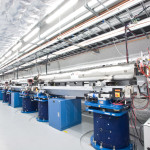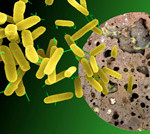During standard X-ray solution scattering experiments, molecules scatter X-rays as they tumble around during exposures, resulting in a diffraction pattern with matching measurements along all angles due to the full orientational averaging. When X-ray snapshots are collected at timescales shorter than a few nanoseconds, such that molecules are virtually frozen in space and time during the scattering experiment, X-ray diffraction patterns are obtained that are no longer equal along all angles. These measurements are collected using a method called fluctuation X-ray scattering, typically performed on an X-ray free electron laser or on a ultra-bright synchrotron. This technique can provide fundamental understanding of biomacromolecular structure, engineered nanoparticles, or energy-related intermediate-scale materials not attainable via standard scattering methods.
First Bioprocess Pilot-Scale Production of Malonic Acid from Renewable Resources
Lygos and Lawrence Berkeley National Lab’s Advanced Biofuels Process Demonstration Unit have collaborated to scale up production of biomass-derived specialty chemical. Lygos, Inc., announced today that it has successfully achieved pilot scale production of malonic acid from sugar. Lygos’ novel manufacturing technology decreases CO2 emissions, eliminates toxic inputs and could replace the existing petroleum production process for malonic acid at lower cost and less energy.
LDRD Update: Six PBD Researchers Awarded FY15 Funding and FY16 Announcement
The projects of six Physical Biosciences Scientists and Engineers received funding through the FY2015 Laboratory Directed Research and Development (LDRD) program. These projects cover a broad range of topics, including energy, biomanufacturing, and technology and tool development. Together, these efforts account for nearly 15% of the $24.9 million allocated. Eighty-two proposals were selected from a field of 169. There was an equal distribution of new and continuing projects among the selected PBD proposals.
Instrumentation Advances Expand the Reach of X-ray Free Electron Lasers
Femtosecond crystallography (FX) is especially suitable for studying radiation sensitive enzymes that require metals for their function, as the extremely short and bright X-ray pulses can produce a diffraction image before any atomic motions can occur in the crystal. This cutting edge method is capable of extending our capacity to study smaller, more fragile crystals and determine the catalytic structures of biologically relevant macromolecules.
Microbes-to-Biomes (M2B) Initiative Launches
The Labwide initiative, Microbes-to-Biomes (M2B), has kicked off with five projects funded through the Laboratory Directed Research and Development (LDRD) program, and a new website to chronicle news and advancements in M2B’s research mission. The M2B initiative is designed to explore and reveal the interactions of microbes with one another and with their environment – interactions that are vital to the Earth’s future.
Was this page useful?







